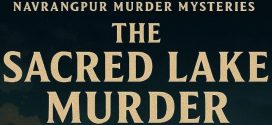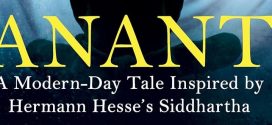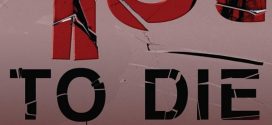Reading is to mind what exercise is to body.
Do you believe in this saying?
We do.
All the muscles are developed when they are challenged. And it seems true for the “little grey cells” also :)!
We love reading thrillers that keep us involved with the story and make us keep guessing the unrevealed stuff of the story till respective point.
It is one of the reasons we love reading books penned by Mr. Vish Dhamija.
Our regular readers know that we share our unbiased reviews for his books periodically, at irregular intervals. Here are some quick links in the same regards.
- Bhendi Bazaar | A Crime Thriller
- The Mogul | Book Review
- Nothing Else Matters | Book Review
- Deja Karma | Book Review
- Unlawful Justice | Book Review
- Nothing Lasts Forever | Book Review
- Doosra: The Other One | Book Review
Fortunately we also got a chance to have an author interview with him.
One of his latest books, Prisoner’s Dilemma was on our radar since long. Recently, we found an interesting deal on Amazon India and we took advantage of that opportunity.
From our team, I got the chance to read this book and share my personal thoughts about it, with you all.
So, let us start with the cover page of the book.
This Is Here In For You
Book Cover:
As per the famous saying “we shouldn’t judge a book by its cover”.
True.
However, we cannot ignore a cover page’s influence on purchase and/or read decisions.
The reason is quite simple.
The cover page serves as the gateway to the virtual world explored within the book. And, thus, it makes the first impression of the book. We, human beings are wired to be attracted towards beautiful stuff by nature. So, it is obvious for us to pick a book with attractive cover page from the set of the same and fiddle through its pages or blurb.
Then of course, if we find it interesting, we will go for it, or otherwise, we may leave it.

Prisoner’s Dilemma By Vish Dhamija | Book Cover
As you can see, the cover page of Prisoner’s Dilemma is quite attractive.
We see two prisoners sitting in the opposite sides of a wall seeing in the opposite directions – on the cover page of the book. It is the perfect representation of their situation. They know they are there but don’t know what the other fellow is thinking or has spoken so far, or planning to do in near future.
The dark background through which they are seen represents their mental condition and possible future quite well.
I like the cover page.
Storyline:
Let us take a bird’s eye view of the story.
The story starts on Thursday, 16 January 1997, at the Sadar Police Station, Gurgaon, Haryana, where Sr. Inspectory Arfy Khan is in-charge.
A young fellow named Mr. Bipin Desai has been brought to a police station. Bipin thought throughly about what could have been the reason he was brought into the police station, and that too regarding an investigation! He, however, didn’t find a clue.
While representing himself as totally clueless about why he is brought it, and why he is being questioned; he also throught about, “what possibly could have went wrong?” and is there actually any link to him regarding the heist the police officer, Sr. Ins. Arfy Khan is asking him about?
His mental analysis convinced him that there is nothing that can lead it to him. After all, it was a perfect and foolproof planning.
But, why and how then he was caught? Or the police is just pushing its luck?
More importantly, he is worried about his friend cum partner in crime, Anuj Shastri. Anuj is not very thoughtful or mentally strong. So, if he is caught, it is sure that he would spill some beans for sure.
Over the course of the story we meet Bipin Desai, Arfy Khan (Senior Inspector, Haryana Police), Anuj Shastri, Manasi Upadhaya, Atul Shastri, Manjula, Advocate Mr Sriram Sharma, Constable Bhim Singh, Commissioner Raj Mehra, Rajendra, and others.
Storyline:
I will try to avoid as many spoilers as possible but please read with the consent that some of them are inevitable.
The story is distinguished into mainly two segments where two parallel threads are running. One thread is taking you through in the linear manner through the incidents happened earlier in the lives of Bipin, Anuj and Manasi. The second thread also proceeds in the linear manner (in this way it is different from the sequence of “Memento” film) in the present time where incidents mostly happened in the Sadar police station.
Weaving of these threads is really interesting and you come to know about the whether the haste was actually performed by Bipin and Anuj or not, at very early in the book!
It then hooks you with the proceedings and makes you curious about “whether Sr. Ins. Arfy Khan is going to uncover the truth?”. And, whether by applying “Prisoner’s Dilemma” theory whether he is on the right track or not?
By the way, the author has defined the term “Prisoner’s Dilemma” as:
Prisoner’s Dilemma is an aspect of Game Theory that shows why two rational individuals might not or cannot cooperate with each other, even if it is in their best interest to do so.
In simple words, as you had seen in many movies and TV Shows, the partners in crime are interogetted separately without knowing what the other(s) has told and whether he/she should tell the truth or accept the offer (if any) by law-enforcement agency and save his/her neck from harsh punishment. As the possible culprits cannot contact each other, they had to keep guessing what their counterpart(s) has done, and often fall for his/her own interest. Resulting into resolving the case.
The enthusiastic reader who love exploring Police Procedural genre, will surely like the way the author has defined another theory:
A Turf War is generally described as an acrimonious dispute between conflicting groups over a geographical territory.
It is not a pure suspense thriller as far as the main crime is concerned. The way, the things are progressing through, they brings you a surprise element at the end. And, that makes you feel satisfied that you read it till the end.
The strongest part of the book is not the main story only, but its layered characters and realistic representation.
You will develop a soft corner for Bipin Desai and through his character you can elaborate the essence of true friendship. The relationship of the friends trio, and how it played a vital role in all the events through the story.
The generation gap, the understanding parents, the rigit parents, the worried for the future of their child(ren) – paents, and other aspects of the social canvas in India, is elaborated authentically in the book. I think, the following block is a good represetation of the same:
The parting at the temple was no less than a bidai, another customary affair. A lot of strangers in the temple had gathered to cry along to make it appear a lot more dampening than it should have been when saying goodbye to a one- day- old, borrowed daughter.
Of course, the life is not fair, nor it is guaranteed to be. And, in those aspects, the book elaborates the things in realistic manner. There are some interesting conversations about the realities of the life in the book that I enjoyed. For example:
‘What’s money got to do with love, Pa? Money isn’t everything …’
‘It’s not everything, but it’s one of the most important things to survive in this world.
The author is good at elaborating scenes and emotons. Some lines are so ineresting that you will appreciate the wordplay. For example:
A film of nervous sweat covered his forehead. Thank god for the eyebrows that stopped the sweat from getting into his eyes.
The dose of sarcasm is an inevitabe part of thrillers, right? Here also you can find lines like:
‘Are you a broken gramophone record or do you think I’m stone deaf or brain- dead that I didn’t hear you the first couple of times?’
– – – – – – – – – – – – – – – – – – – – – – – –
‘I haven’t seen God. That does not mean He doesn’t ….
These lines represents the character of Arfy Khan, quite well. One more of his characteristic of forgetting name is quite interestingly explored in the bool. I think most of the readers will enjoy this side of his character:
‘Oh, he’s the same guy, Alok Shastri, Atul Shastri, …
Didn’t William Wordsworth say, “What’s in a name?”’
And so does the coversations like:
‘Sure, where do I start?’ Bipin sounded resigned.
‘Well, the beginning is always good …’
– – – – – – – – – – – – – – – – – – – – – – – –
What do you want to be? Batman, Spiderman or Superman?’
‘Someone who does not wear their underpants over their trousers.’
Here is another interesting converation (Mr. Sharma is an advocate):
‘Thank you so much, Mr Sharma.’
‘Don’t mention it.’ Sharma smiled.
‘In our profession saying, “you’re welcome” isn’t taken as something positive.
While the following line is written in the context of money transferring operation, it reflects the human psyche quite well.
The duller the driver and van, the safer the cargo.
Here are some other interesting lines from the book that I cannot resist myself from quoting:
The naked truth was, humans took what they had for granted: it was their birthright.
– – – – – – – – – – – – – – – – – – – – – – – –
Sometimes conscience takes a back seat. At other times, people ignore the little voice inside them to pay heed to their desires instead.
– – – – – – – – – – – – – – – – – – – – – – – –
Greed always finds a reason to take over the astute mind. At the very least, it furnishes practical options to rationalize things.
– – – – – – – – – – – – – – – – – – – – – – – –
In my opinion, people who steal from others, people who injure and kill others shouldn’t talk about rights at all. What about the rights of the people they hurt or cause damage to?’
And, the following is the topping on the sweet:
TIME IS A MAN- MADE CONSTRUCT. Empty moments seemed to pass idly enough to shame a tortoise walking with a Zimmer frame, but during tense situations, time dissolved faster than a bubble in moving waters.
Writing mystery and forgetting the famous detectives! How can it be possible?! I love references to Sherlock Holmes and Hercule Poirot here :).
He had always known Anuj was a little challenged in the grey cells department.
– – – – – – – – – – – – – – – – – – – – – – – –
‘You are a genius.’ ‘Elementary, my dear Anuj, elementary.’
And, so does the references of cinema…
‘I’ll be back,’ Arfy drawled in an accent that in his confused mind was meant to sound like that of Arnold Schwarzenegger.
– – – – – – – – – – – – – – – – – – – – – – – –
‘I’m quite confident that if Clint Eastwood came to hear of your daylight heist he’d offer you the royalties for a screenplay, and who knows you might even get invited to the Oscars with all their pomp and circumstance.’
Just remember that the joker can be the game changer when it comes to the game of cards.
And, you will enjoy the book even more.
Of course, there are some scenes meant for mature readers, as is the case with most of the thrillers.
I am avoiding some elements of the story in this discussion to avoid spoilers.
Summary:
It is a nicely written thriller where suspense is revealed much earlier and still it keep the reader glued to it. It could have been better, but nonetheless an interesting reading experience for sure.
ThinkerViews Rating:
Around 8 stars out of 10.
Quick Purchase Links:
- Buy - Prisoner's Dilemma by Vish Dhamija - Paperback - Amazon IN
- Buy - Prisoner's Dilemma by Vish Dhamija - Kindle EBook - Amazon IN
- Buy - Prisoner's Dilemma by Vish Dhamija - Paperback - Amazon US
- Buy - Prisoner's Dilemma by Vish Dhamija - Kindle EBook - Amazon US
Over To You:
If you already have read the book do share your remarks and thoughts via comments below. Does this review help you in making your decision to buy or read the book? Do not forget to share this article with your friends over various social networks. Please follow/subscribe us on various Social networks like Twitter, Facebook, YouTube, Spotify, Amazon Prime Music, Audible, and others. And yes, you may like to subscribe to our RSS feeds to get latest updates for the site to land right in your mail box.
 ThinkerViews – Views And Reviews Personal views and reviews for books, magazines, tv serials, movies, websites, technical stuff and more.
ThinkerViews – Views And Reviews Personal views and reviews for books, magazines, tv serials, movies, websites, technical stuff and more.



